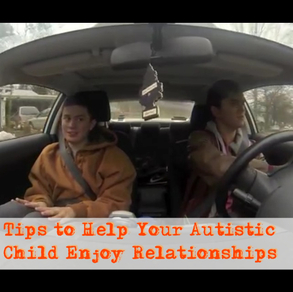How do I foster this kind of relationship?There are really two parts to that question. The first part is helping a person with autism enjoy connecting, which I'll talk about here. In a future post, I'll discuss helping their sibling, parent, grandparent, friend, etc. understand how to interact with them in order to foster relationships and make connecting with other enjoyable for a person with autism, instead of stressful. Note: You'll need to adjust these ideas to the person's developmental level; however, the principles are the same regardless of level of functioning. Join them first, before trying to draw them outIt's easy to fall into the trap of trying too hard to get a child or an adult with autism to interact, talk to you or back to you, to acknowledge you, etc. The first step is to do what they are doing. Join their activity, but avoid trying to get them to "play with you" at first. If a child is stacking toys or arranging things, see if you can stack, too. Follow their lead, do it the way they are doing it. If they push you away or ignore you, that's ok. Back off and try again in a minute. You can narrate what they are doing by saying something like, "Oh, the car is parked on the table. Now, it's driving on the floor." Begin with activities they really likeFind an activity that the child really enjoys and can do well. This starts you off with the child in a positive frame of mind. Help them do what they are doing, even if they ignore you. Back off if their seems to be frustration, try again once they are settled. A minute or two is usually enough. Do something unusual to invite comment or engagementOnce you've done what they are doing for a bit, do something unexpected or unusual. Stay with the same activity, but do something that invites comment and interaction. Put the toy on your head or put the object somewhere unusual. If you need to get their attention, make noises of surprise and narrate what you're doing. "What is this doing on my head?" - See more at: http://www.spectrumpsychological.net/1/category/Autism/1.html#sthash.C1gjbh0L.dpuf Slow down if the interaction causes too much stressTry to get an interaction two or three times, but if it seems to be causing significant stress back off some and let things cool off. You might need to slow down or try a different approach. Do you need to lower your voice and slow your actions to calm things down? Or do you need to raise your pitch a bit and get excited to encourage your child to interact? Consider your child's sensory profileWhat usually helps them calm down? What makes them happy or excited? If you haven't gotten a sensory profile done, check with your therapist. It is an extremely helpful tool for understanding what kinds of things you can do that will work best to encourage interaction. A Sensory Profile lets you know what sensory experiences overwhelm your child. I use it to help determine how best to approach a child in play therapy and what recommendations to make to parents for home play. How does this help them form relationships?
For some parents that means you want your child to say, "I love you." Or to play a game with a brother or a sister. For people with high functioning autism, we might want them to be able to show and experience better empathy or simply to enjoy doing things with their family. It means different things for different families, but the goal is to encourage relationship. It's not about forcing Autistics to changeThe goal is not to force them to change autism behaviors, but to come alongside them and enjoying what they are interested in with them. Instead of trying to drag them out of their comfort zone and to be more "normal", we are engaging them in a way that helps them enjoy relationships, instead of dreading interaction. What are your best memories of Autism?In her post Suzi said that she showed this video to her sons, one of whom has autism and the video prompted great moment where her older son admitted "that he loves [his brother with autism] ... that they are best friends... that he gets him more than anyone else.... that he would protect him forever. AND, that he would give [him] his most prized possession... His Angry Bird Pig." It will make my day to hear about your stories, make sure to leave me a comment about your favorite memory. I love to hear from you and always answer your comments! Final note, most of these ideas are based on the ideas presented in the book Engaging Autism by Stanley Greenfield. I highly recommend this as a reference book for parents. It is a bit technical, but worth looking through sections relevant to your situation. (I have no affiliation to the author, or publisher, and receive no compensation from any third party for this post)
|
Nikki Schwartz,
|





 RSS Feed
RSS Feed
